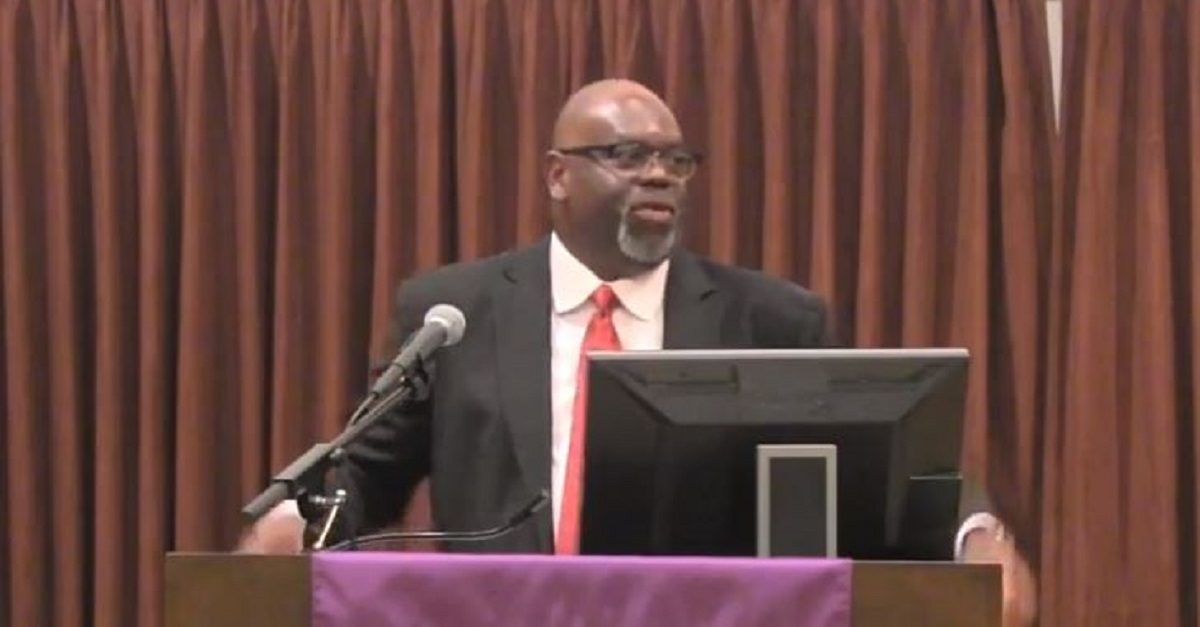
A black federal judge in Mississippi delivered an impassioned speech against historical, race-based “assaults” on the judiciary, saying that such attacks are still going on in the present day. District Judge Carlton Reeves spoke about this while accepting the Thomas Jefferson Foundation Medal in Law on Thursday at the University of Virginia School of Law. He did not hold back, citing many of President Donald Trump‘s tweets and comments to illustrate his belief the the country is at risk the way it was during the days of segregation and the KKK.
Reeves, who was appointed to the bench by President Barack Obama in 2010, recalled how the lack of diversity in America’s past led to troubling decisions like the Dred Scott case, and how “courts were led to falsehood” because they lacked “the black experience.” When this started to change, there was a pushback.
“In Mississippi and across the South, the Klan responded to the threat of democratic justice by trying to assassinate black judges, shooting black jurors, and murdering federal court officers,” Reeves recalled, pointing out that the Klan’s plan worked.
“The great assault on the judiciary succeeded. Black perspectives were again banished from our courts, especially in my Mississippi. But barren of the experience of a majority of its citizens, our courts saw only a disfigured growth, like a tree raised with water but not light,” he said. That resulted in the “tree” yielding “strange fruit” like the Plessy v. Ferguson “separate but equal” decision that allowed segregation.
With segregation came another pushback, Reeves said.
“White power returned to the playbook of the past: smearing judges, shrinking judicial power, and scrubbing diversity from courtrooms,” he said, mentioning lawmakers like John Stennis, Strom Thurmond, and George Wallace, who attacked the federal judicial system by denigrating the federal court system, and the “massive resistance” of the Southern Manifesto of 1956 that criticized racial integration.
“Black folks across the country who had the gall to ask for justice were interrogated, tracked, beaten, jailed, bombed, and murdered,” Reeves recalled, “sometimes by officers of justice themselves, the police. Judges who sought to deliver justice faced an ‘onslaught’ of death threats and hate mail. Their pets were poisoned. Their children’s graves were desecrated.”
While the country–and the judiciary–enjoyed progress after this period, Reeves said that things have taken another turn for the worse.
“We are now eyewitnesses to the third great assault on our judiciary,” he said, pointing to President Trump’s tweets and other remarks about judges, specifically his comments about Judge Gonzalo Curiel. Trump claimed that Judge Curiel would be biased against him because he’s of Mexican descent (he was born in the U.S.) and because Trump has called for a wall at the Mexican border.
“I know what I heard when a federal judge was called ‘very biased and unfair’ because he is ‘of Mexican heritage,'” he said. “When that judge’s ethnicity was said to prevent his issuing ‘fair rulings.’ When that judge was called a ‘hater’ simply because he is Latino. I heard the words of James Eastland, a race-baiting politician, empowered by the falsehood of white supremacy, questioning the judicial temperament of a man solely because of the color of his skin. I heard those words and I did not know if it was 1967 or 2017.”
He then quoted language from a number of tweets, which were cited via footnotes in the published version of the speech.
“And when the Executive Branch calls our courts and their work ‘stupid,’ ‘horrible,’ ‘ridiculous,’ ‘incompetent,’ ‘a laughingstock,’ and a ‘complete and total disgrace,’ you can hear the slurs and threats of executives like George Wallace, echoing into the present,” he said.
In addition to the president’s past remarks, however, the current demographics of Trump’s judicial picks have been problematic, Reeves claimed.
“Of the Article III judges confirmed under the current Administration, 90% have been white. Just one of those judges is black. Just two are Hispanic,” he noted.
He said that’s no accident, either.
“This Administration and a bare majority of the Senate, walking arm-and-arm, are not stumbling unaware towards a homogeneous judiciary,” he concluded.
[Image via Millsaps College screengrab]